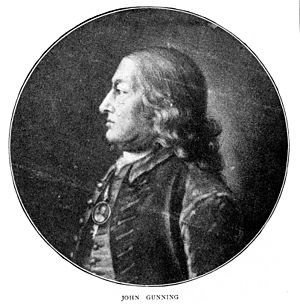John Gunning (surgeon) facts for kids
John Gunning (1734–1798) was an important English surgeon who lived in the 1700s. He was known for his medical skills and for trying to improve how medical organizations were run.
Contents
Early Life and Medical Training
John Gunning was born in Swainswick, England. His father was also named John Gunning, and his mother was Elizabeth Lymen. Young John went to school at Winchester College starting in 1747. Even though he was the oldest son, he didn't receive an inheritance from his father.
Gunning began his medical career as an assistant surgeon at St. George's Hospital in London. He worked there from 1760 to 1765. After that, he became a full surgeon at the hospital and stayed in that role until he passed away.
Working with the Surgeons' Company
In 1773, John Gunning was chosen to be the Steward of Anatomy by the Surgeons' Company. This was a group for surgeons. However, he decided to pay a fee instead of taking on the duties of the role.
Later, in 1789, he was elected as an Examiner for the Company. In the same year, he became the Master of the Company. During his time as Master, he worked hard to make big changes to how the Company was managed and how it did its work.
Gunning's Push for Reform
John Gunning was very direct about what he thought needed to change. He believed that the Company's meeting rooms and library were not being used properly. When he finished his term as Master on July 1, 1790, he gave a strong speech. He said:
- "Your theatre," he explained, "is without lectures, your library-room without books is converted into an office for your clerk, and your committee-room is become his eating-parlour … If, gentlemen, you make no better use of the hall than what you have already done, you had better sell it, and apply the money for the good of the company in some other way."*
After his speech, a special committee was formed to look into his suggestions, and many positive changes were made. In 1790, Gunning was also named the first professor of surgery. But he soon left this position, saying it took up too much of his time. No one else was appointed to the role after him.
In 1793, Gunning was given an important job: Surgeon-General of the army. This meant he was the chief surgeon for the military. He also served as a senior Surgeon Extraordinary to King George III.
Gunning's Disagreement with John Hunter
John Gunning often had disagreements with his fellow surgeon at St. George's Hospital, John Hunter. Hunter was sometimes bossy with other doctors and seemed to focus more on unusual research than on regular surgery.
Their disagreement became very strong during an election for a new surgeon. Gunning supported a surgeon named Thomas Keate, while Hunter supported Everard Home. After a tough competition, Keate was elected.
Another argument happened over fees for surgical lectures. This led to a public debate between Gunning (who was the senior surgeon and had the support of two colleagues) and Hunter. This disagreement continued until John Hunter's death on October 16, 1793.
The Surgeons' Hall and Legal Challenges
In 1796, the Surgeons' Company decided to sell their building, known as Surgeons' Hall, because it was too expensive to fix. However, when they tried to sell it, no one offered a high enough price, so they kept it.
Around this time, a new member, Henry Cline, was elected to the Court of Assistants. This election happened when one of the governors had just passed away and another was ill. This situation caused a problem with the Company's official charter (its legal document).
To fix this, a bill was brought to parliament in 1797. This bill aimed to protect the Company and give it more power over the medical profession. The bill passed in the House of Commons but was stopped in the House of Lords. Some say this was because of Lord Thurlow, who had a grudge against Gunning. Lord Thurlow had once said, "There's no more science in surgery than in butchery." Gunning had famously replied, "Then, my lord, I heartily pray that your lordship may break your leg, and have only a butcher to set it."
John Gunning passed away in Bath on February 14, 1798.
Family Life
In 1768, John Gunning married Dorothy, who was the sister of Richard Warren, a doctor to the King. They had five children: a son named John (1777–1847) who never married, and four daughters. His nephew, also named John Gunning (1773–1863), followed in his footsteps and became a military surgeon. This nephew was the son of John Gunning's brother, Rev. Joseph Gunning.
 | John T. Biggers |
 | Thomas Blackshear |
 | Mark Bradford |
 | Beverly Buchanan |


